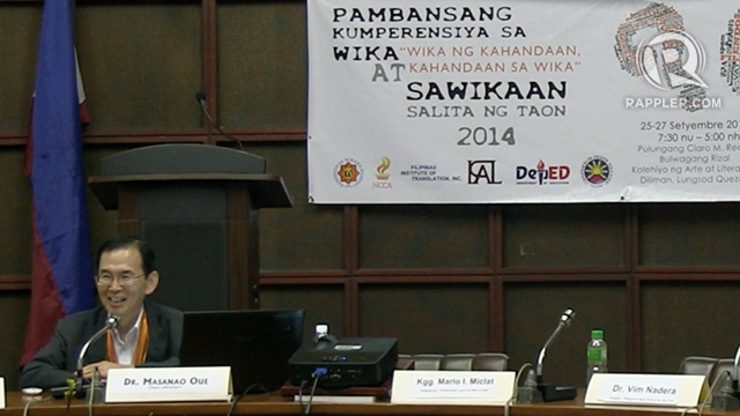SUMMARY
This is AI generated summarization, which may have errors. For context, always refer to the full article.

MANILA, Philippines – What can the Philippines learn from Japan when it comes to the development and propagation of a national language?
A lot, according to a Japanese professor who recently shared – in Filipino – with language experts in the Philippines his country’s experience.
During the National Conference on Language held at the University of the Philippines (UP) on September 25, Dr Masanao Oue of Osaka University shared the history and current state of the Japanese language.
Oue has been teaching Filipino to Japanese students for 23 years now. He was the first foreign student to graduate with a masters degree in Filipino in UP.
He has also served in the Japanese Foreign Ministry as an expert in the Tagalog language, as well as in the Japanese Embassy in the Philippines.
Development of Japanese language
Oue said that the national language of Japan was born during the Meiji period (1868-1912). It was based on the dialect spoken in Edo (now Tokyo). At the time, various dialects were prevailing in the different han (domains or provinces) in the country.
For the Japanese people to better understand each other, Oue said, the government at the time imposed one standard language to promote the idea of “Japan as one nation, Japanese as one people.”
The state also approved one national textbook on the Japanese language, the Jinjyo Shogako Dokuhon (“Pagbasa para sa Mababang Paaralan” or roughly “Reading for Elementary School Students”) that was first used in 1904.
“Sa kasalukuyan, ginagamit ang wikang Hapon nang walang anumang alinlangan, ngunit dapat matanto at mamalayan ng mga tao na ang wikang ito ay hindi isinilang nang natural, at ibinatay lamang sa wikang inutos ng estado o pamahalaan,” sabi ni Oue.
(At present, the Japanese language is being used freely, but its speakers should realize that this language was not born “naturally,” and was only based on the language that was imposed by the state.)
‘Words of the Year’ in Japan
In his presentation at the University of the Philippines last September 25, Dr Oue also shared the chosen “salita ng taon” (words of the year) in 2013:
Here in the Philippines, the word “selfie” was chosen as the “salita ng taon” for 2014.
- Ima desho! (“Ngayon na!” in Filipino, or “Now!”)
- Omotenashi (friendly approach to guests, or exhibiting hospitality)
- Je je je (“Aba! Aba! Aba!” in Filipino, or an expression of surprise or intense emotion; “je” is repeated depending on the intensity of the emotion)
Despite this, Oue said, some dialects are slowly reemerging. “Dati’y hinding-hindi gumamit ng diyalekto ang tagapagsalita ng NHK, ngunit ginagamit nila ang mga diyalekto ng pinanggalingang probinsiya sa mga variety shows,” he said.
(Before, the NHK spokesperson would never use any dialect, but the TV station would use dialects in variety shows in the provinces.)
The English challenge
Oue said that in October 2013, Japan’s Ministry of Education, Culture, Sports, Science, and Technology announced that it would officially start teaching English to students from the 3rd grade in elementary schools.
This is to prepare for the 2020 Summer Olympics that will be held in Tokyo. The program would also help the Japanese people in keeping up with globalization, said Oue, who admitted that Japan is lagging behind its Asian neighbors when it comes to English.
But the government’s new initiative faces opposition. Oue said that there are those who are hesitant about improving the Japanese’s ability to speak English.
According to those who oppose the program, it is a “punishment” to those who do not use or need English in their daily lives.
“Mga piling estudyanteng gustong sumikat sa pangangalakal, diplomasya, pagsasalin, at iba pang propesyong nangangailangan ng Ingles na lamang ang dapat bigyan ng espesyal na edukasyon,” the professor said.
(Only select students who want to have a career in commerce, diplomacy, translation, and other professions that use English should undergo the special education.)
Lessons for the Philippines
After the conference, Rappler talked to Dr Oue, and asked him if the Philippines could mirror what Japan has done to develop and promote its national language.
“Magkaiba itong sitwasyon, ano? Kasi sa Japan eh mga diyalekto lamang. Dito naman sa Pilipinas ay mga wika. Mas mabigat ang pagkakaiba ng bawat wika kaysa sa diyalekto,” Oue answered.
(We have different situations at hand. In Japan, we’re talking about dialects. Here in the Philippines, we’re talking about languages. Differences are more stark between languages than between dialects.)
While saying that the solution is complex here in the Philippines, Oue said that both the national and native languages are important. Filipinos should not stop using the Filipino language, but at the same time, native languages should be preserved. (READ: Land of 200 tongues: Gov’t maps Philippine languages)
Asked about his favorite word in Filipino, he said: saling-pusa. “Hindi ka tunay na miyembro, pero nakikialam pa rin. (You’re not a member, but you still meddle.)”
“Pero hindi ako saling-pusa sa kumperensiyang ito ah (But I’m not a ‘saling-pusa’ in this conference),” he quicky added in jest. – Rappler.com
Add a comment
How does this make you feel?
There are no comments yet. Add your comment to start the conversation.